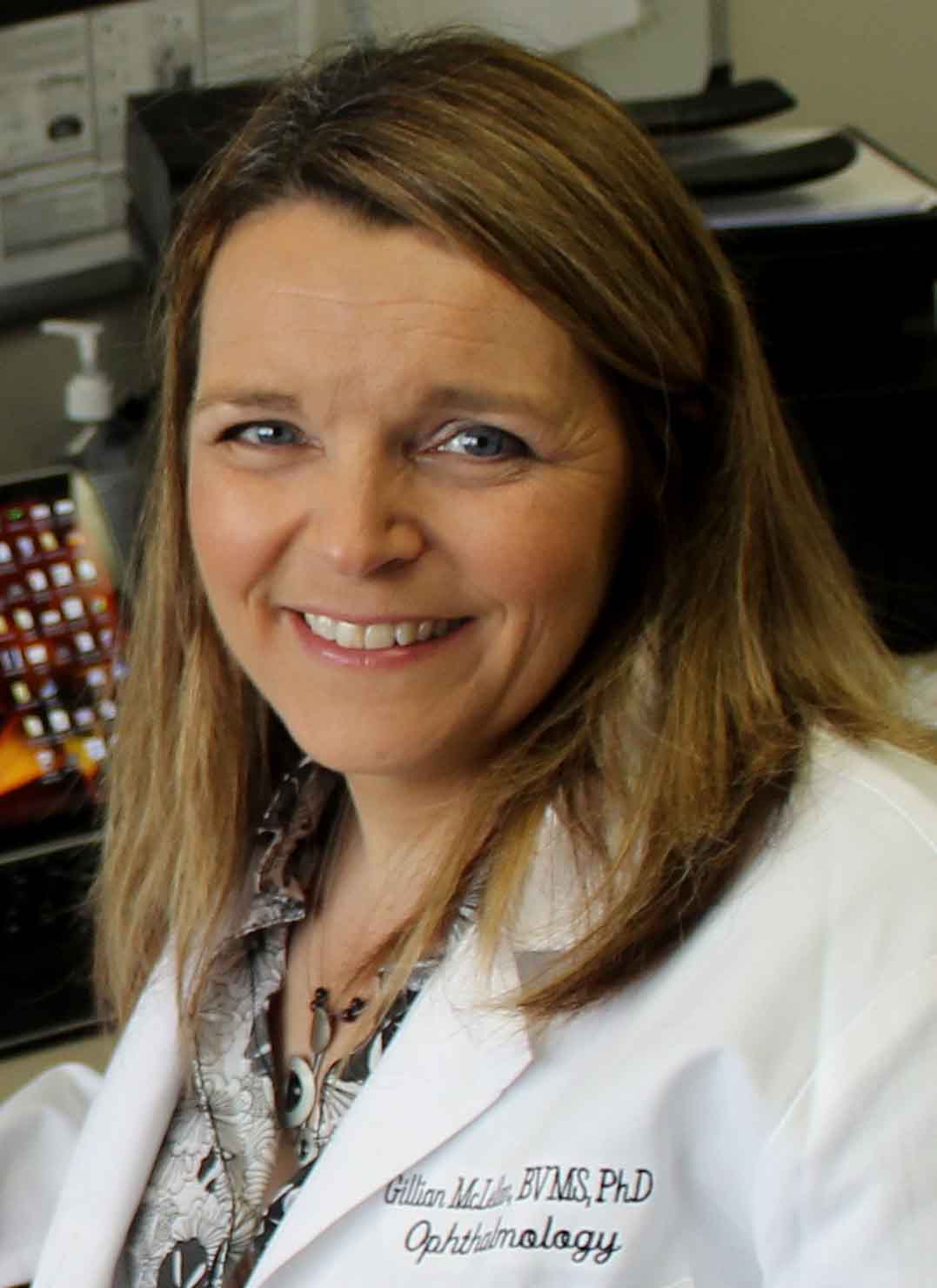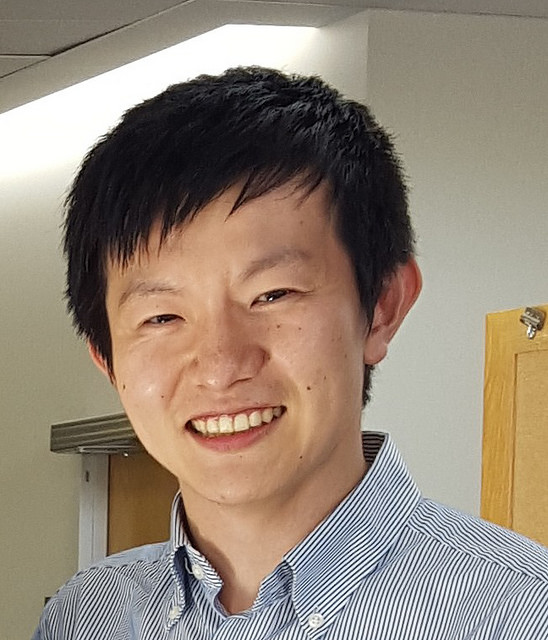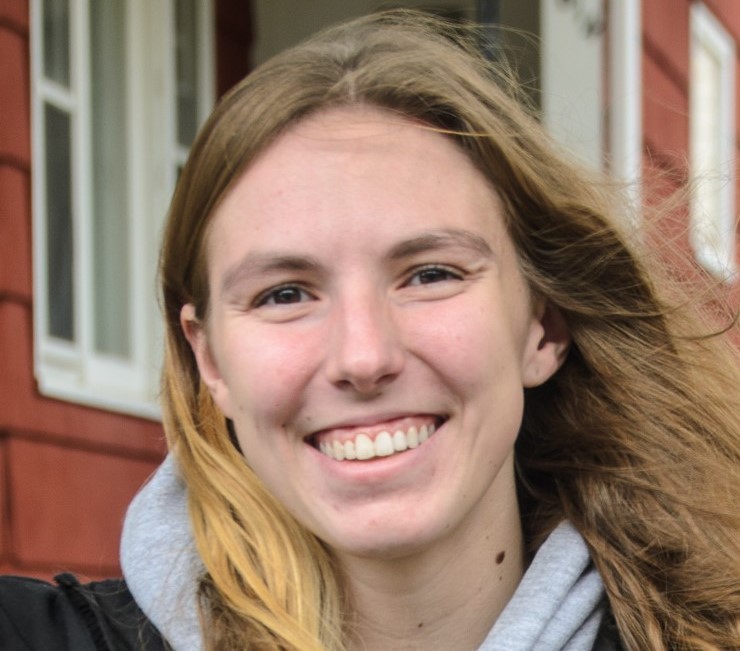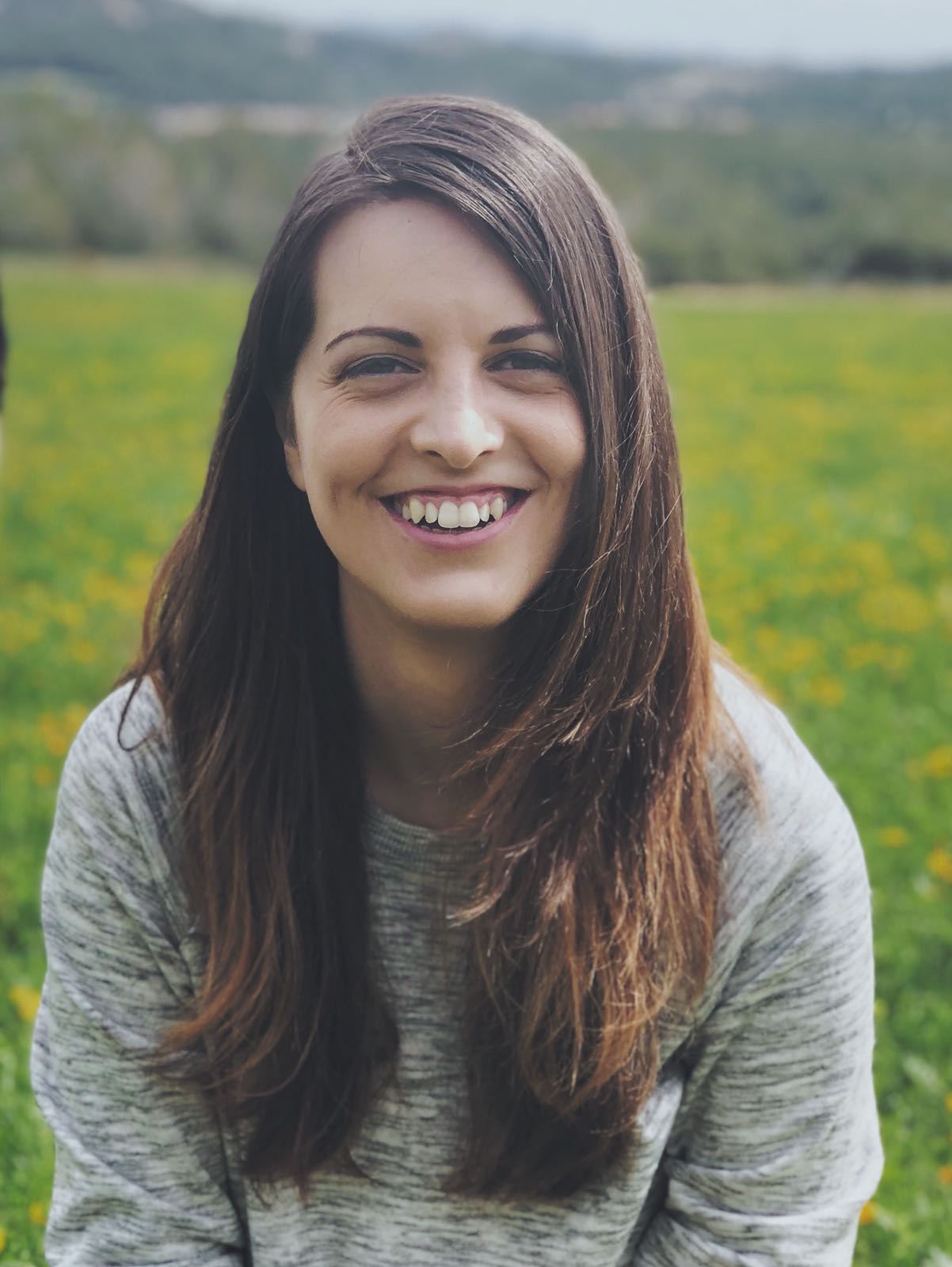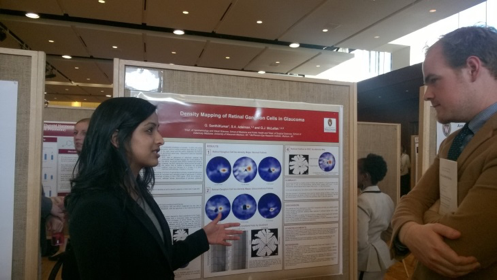Gillian McLellan, BVMS, PhD, DECVO, DACVO
Credentials: Professor
Tim and Nancy Speaker Chair in Canine Health
I graduated from Glasgow University in Scotland in 1990 and worked in general veterinary practice for a few years before moving to London, where I completed a PhD and served as a lecturer in Ophthalmology. I crossed the Atlantic in 2000 to join the faculty at UC-Davis, then Iowa State University before moving North to Wisconsin where I currently hold a joint faculty position in both the School of Medicine and Public Health and School of Veterinary Medicine at the University of Wisconsin-Madison. A European Specialist in Veterinary Ophthalmology, I am a Past-President of the European College of Veterinary Ophthalmologists (ECVO), serve on the Editorial Board of the Journal Veterinary Ophthalmology, and have co-authored two textbooks: the BSAVA Manual of Canine and Feline Ophthalmology and Veterinary Ocular Pathology. My main research focus is comparative glaucoma but I treat the full spectrum of eye disorders in veterinary patients in my clinical practice at UW Veterinary Care. Outside of work, I enjoy live music, good food and spending time outdoors (wind-chill permitting) with my husband and very energetic twin boys. We share our family home with four cats and a chinchilla.
Kazu Oikawa, DVM, PhD
Credentials: Post-Doctoral Research Associate
I earned my BVSc (equivalent to DVM) in 2012 from Azabu University in Japan. For three years in the veterinary school, I worked in the veterinary ophthalmology department to assist with ophthalmic examinations and surgical operations. After earning my Japanese national veterinary license, I moved on to Nippon Veterinary Life-science University where I completed a rotating internship at the veterinary teaching hospital and joined a clinical pathology lab where I conducted an investigation of somatic gene mutational status in feline diffuse iris melanoma. I joined Dr. Gillian McLellan’s lab in September 2014 as a PhD student. Since completing my PhD, I continue to study the pathophysiology of glaucomatous optic neuropathy utilizing next generation sequencing and biomolecular techniques. Back home in Japan, I have a shiba dog and four domestic tabby cats who I’ve grown up with and my career goal is to become a veterinary ophthalmologist clinician-scientist.
Julie Kiland, MS
Credentials: Researcher
I’m a Researcher with over 20 years of experience in glaucoma research and have worked closely with Dr. McLellan in her studies of feline glaucoma since 2008. I earned my BA in Psychology at UW-Madison. After graduation, I joined Dr. Paul Kaufman’s lab studying the ocular diseases glaucoma and presbyopia. In 2003, I received my MS in Veterinary Science, while in the Kaufman lab. My graduate work focused on a possible association of intraocular pressure (IOP) lowering drops in decreasing flow through the conventional aqueous humor outflow pathway. In 2012 I obtained a Master’s certificate in project management from the UW School of Business and have been involved in the planning, conduct, and data analysis for a number of key studies including validation of rebound tonometry in monkeys and cats, as well as non-invasive in vivo electrophysiology, IOP, and in vivo imaging (fundus photography, fluorescein angiography, and OCT) studies. When not in the lab, I enjoy playing with my 2 standard poodles and 2 cats, biking, hiking, and playing bass in a couple of local rock/pop/alternative bands.
Viriginia Mathu, BS
Credentials: Research Assistant, Comparative Biomedical Sciences Graduate Program
Since joining Dr. McLellan’s lab as an undergraduate student in 2019, I have been assisting with electroretinography and intraocular pressure measurements in cats. In 2020 I graduated from UW-Madison with a B.S. in chemistry and a certificate in art history. After graduation, I decided to continue my work in the lab as a research intern. Currently, I am assisting with exploring the mechanisms of glaucoma and Alzheimer’s disease using electrophysiology and microscopy techniques, and I have also learned characterize and culture feline and canine trabecular meshwork cells, which are believed to play a role in regulating intraocular pressure. In my free time, I can be found frequenting the public library, hiking around Madison, or painting.
Odalys Torné Escudé, DVM
Credentials: Research Assistant, Comparative Biomedical Sciences Graduate Program
I graduated in Veterinary Medicine (similar to DVM) in 2016 from the Autonomous University of Barcelona. Early on my professional career, specifically during my last year externship at Texas A&M University, I developed an interest in comparative ophthalmology. Since my graduation I attended several international ophthalmology-related meetings like ECVO, ACVO and ARVO. In 2019 I completed a rotating internship in the biggest small animal hospital in Spain (Ars Veterinaria) during which I was involved in a project related to funduscopy teaching models and presented it at the ECVO conference in 2019. After that, I decided to pause my clinical training in favor of basic research to contribute to the scientific community and get a better understanding of this fascinating world of eye diseases. As a graduate student pursuing a PhD in the McLellan lab, I’m working on multiple projects related to glaucoma, including cell culture of the trabecular meshwork and imaging the aqueous humor outflow pathway via immunolabelling and tissue clearing, applying advanced imaging techniques. My dream is to pursue a vision research career as veterinary clinician – scientist. When I am not working I enjoy outdoor activities. Whenever I can I go out for a run with my dog Zoran, but I also enjoy playing volleyball, listening to music and eating at good restaurants (I love Mediterranean cuisine).
Current Undergraduate Students
- Kelly Koch
- Katherine Lown
- Kristina Shi
- Cade Van Horn
McLellan Lab Alumni
- Sara Adelman, DVM, MS
- Kore Chan, DVM, MS
- Kevin Snyder, DVM, MS, DACVO
- Kara Vogel, PhD ⋅ Post-Doctoral Research Associate
McLellan Lab Undergraduate Student Alumni
- Betsy Elsmo (Undergraduate Laboratory Assistant, 2008-2009; DVM 2013; DACVP Pathologist WVDL)
- Kola Xiong (Directed Study mentee 2009, pre-dentistry; DDS 2015)
- Jessica McDonald (Undergraduate Laboratory Assistant, 2008-2010; DVM 2014; DACVO Private Specialty Practice, Wisconsin)
- Anna Rabinovich (Directed study mentee 2009; pre-optometry, OD 2014)
- Galen Heyne (Undergraduate Laboratory Assistant 2008-2010; MS; UW-Madison DVM 2019)
- Jeremy Kemmerling (Directed study mentee 2009/2010, OD 2015 Western University of Health Sciences)
- Ashley Finch (Directed study mentee 2009/2010; OD 2015 Illinois College of Optometry)
- Laura Ramsey (Directed study mentee 2009/2010; Pacific University, OR; MS/PA 2017)
- Caitlyn Kuehn (Directed study mentee 2010/2011, pre-med)
- Elyse Kleifgen (Directed study mentee 2011; OD 2016 Michigan College of Optometry)
- Owen Bowie (Directed study mentee 2012- 2014; pre-med; MPH UW-Milwaukee; MD class of 2024, MCW)
- Vincent Yaccarino (Directed study mentee 2012; MD Medical College of Wisconsin 2019, surgery resident UW-Madison)
- Jessica Churchill (Directed study mentee 2012, MD Eastern Virginia Medical School, 2017 surgery resident Cleveland Clinic)
- Rachel Sossaman (Directed study 2013, Hilldale Scholar 2013-14, OD Southern College of Optometry)
- Andrea Voss (Directed study mentee 2013, DVM 2017, University of Florida)
- Sarah Adelman (external research mentor 2013, BS Iowa State University; UW-Madison DVM/MS 2018; current ACVO Resident, UC-Davis)
- Lauren Rutkowsky (Directed study mentee 2014/2015, 2016; MPH, Tufts University)
- Alex Shimony (Directed study mentee 2014-2015, pre-med; current Washington University School of Medicine, St. Louis)
- Mary Mohr (Directed study mentee 2014-2016)
- Gopika Senthilkumar (Freshman URS, Research Advisor 2015-2016, current MD/PhD program Medical College of Wisconsin)
- Melanie Loppnow (Engineering Sophomore URS, Research Advisor 2014-2016, BS 2018, MEng Carnegie Mellon 2020)
- Adam Hoefs (Freshman URS, Research Advisor 2014-2015)
- Sarah El-Meanawy (Directed study mentee, 2016-2017, pre-med)
- Daniel Shinsako (Directed study mentee, 2015-2016; University of Illinois, DVM 2021)
- Zachary Makal (Directed study mentee, 2015-2017, Southern College of Optometry OD class of 2022)
- Suzanne Phalen (Directed study mentee, 2017, BS 2017, current Southern College of Optometry class of 2022)
- Sarah Neufcourt (URS, Posse Scholar, pre-vet; Research Advisor 2015 -2016, BS 2020)
- E.J. Temme (2016, BS Iowa State University, Animal Sciences program)
- Colton Wickland (URS, pharm-tox program, pre-law, Research Advisor 2016-2017, BS 2019)
- David Sun (Directed study mentee & Biochem Summer Scholar, 2017, BS 2019)
- Shawna Gloe (Directed study mentee, 2016-2017, BS 2019; MCW MD class of 2025)
- Brad Whalgren (Directed study mentee, 2016-2017, BS 2019, UW SVM class of 2023)
- Abby Rothering (Directed study mentee, 2018-2019, BS 2019, UW SVM class of 2024)
- Nickolas Chen (Directed study mentee, 2016-2017, BS 2019, pre-med)
- Kiley Brauer (Directed study mentee, 2018-2019, BS 2020, UW SVM class of 2024)
- Jacob Lindemann (Freshman URS, pre-med, Research Advisor 2016-2017, BS 2020, MD class of 2024, MCW)
- Brenna Wetherbee (Directed study mentee, 2018-2019, BS 2020, UW SVM Class of 2025)
- Hannah Walleck (Directed study mentee 2019-2021, BS 2021, Illinois College of Optometry Class of 2025)
- Ryan Lopez (Directed study mentee, 2019)
- Sumika Gaddameedi (Directed study mentee, 2020-2021)
- Chloe Mitro (Directed study mentee, 2019-2021)
- Yasmin Nur (Directed study mentee, 2020-2021)
